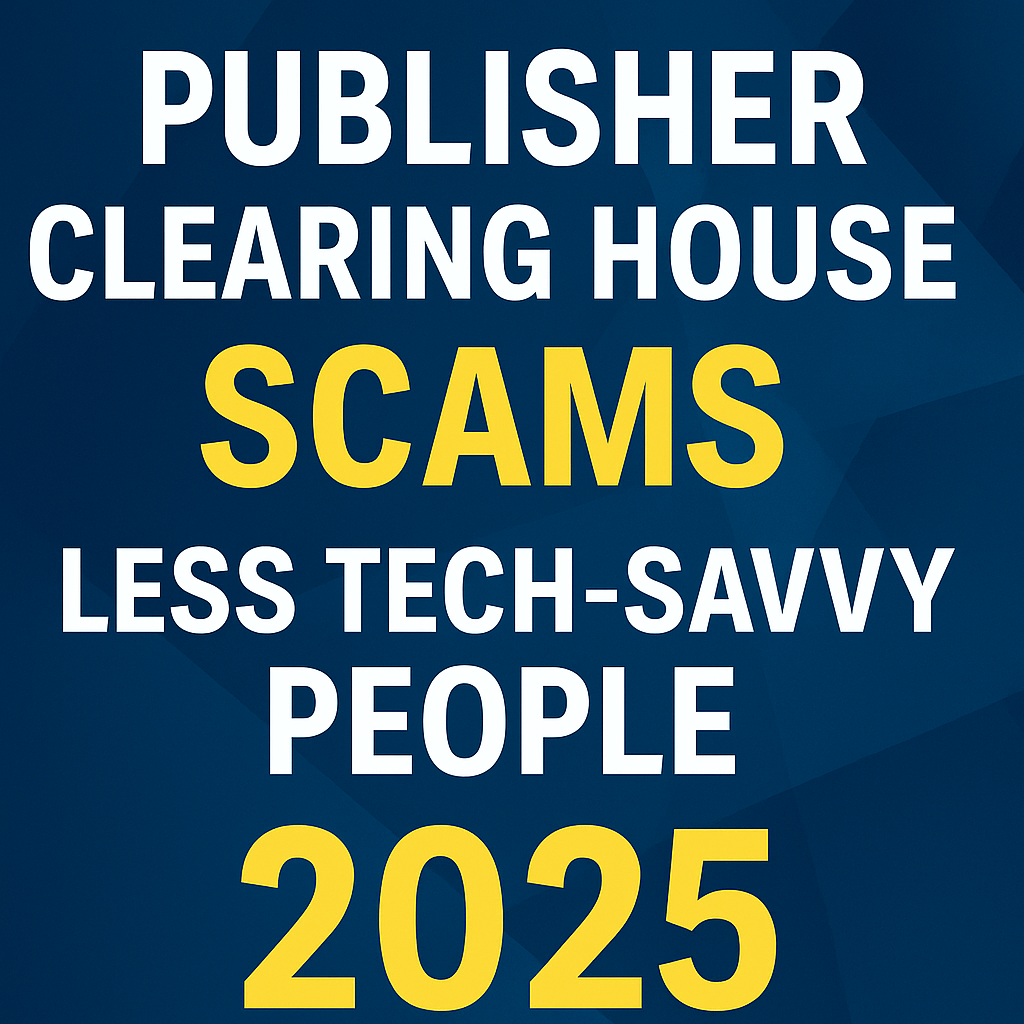Introduction
In 2025, scams are increasing, and for those who are not experts in technology, these scams become even more dangerous. Frauds in the name of Publisher Clearing House (PCH) have caused emotional and financial loss to many people. In this blog, we will explain what PCH scams are, how less tech-savvy people are targeted, and how you can protect yourself .

What Are PCH Scams?
Publisher Clearing House is a genuine sweepstakes company in the USA. But scammers misuse this name and send fake messages, calls, or emails claiming that you have won a big prize like ₹50 lakh, car, or gold coins. When you believe, they ask for money in the name of “processing fee”, “customs charges”, or “verification charges”. When they get the money, they disappear.
Why Less Tech-Savvy People Are Easy Targets
- Don’t know the basic rules of online safety
- Difficult to understand the difference between fake websites and real sites
- Consider every email, SMS or call as real
- Can’t handle the pressure of scammers
- Don’t use scam detection tools or settings
Top Red Flags for Less Tech-Savvy People
1. Too-good-to-be-true messages – “You have won ₹1 crore!”
2. Urgent tone – “Send the money today itself, otherwise the reward will be cancelled.”
3. Request for personal details – Aadhaar, bank, OTP
4. Fake caller IDs or email addresses – look real but are not
5. Link to click or app install – there is risk of malware
Real Case Example
Savitri Devi, a 67-year-old homemaker received a call in which she was told that she has won ₹75 lakh. She was asked to send ₹12,000 as courier charges. When she sent the call, the scammer asked for more money and later blocked the number.
1. FTC Refunds to PCH Scam Victims
In April 2025, the Federal Trade Commission (FTC) announced the distribution of over $18 million in refunds to consumers harmed by Publishers Clearing House’s deceptive practices. Federal Trade Commission+1Federal Trade Commission+1
2. Rise in Scam Losses
Consumers reported losing $12.5 billion to scams in 2024, marking a $2.5 billion increase from 2023. Consumer Advice
What You Should Do (Steps for Protection)
1. Don’t Trust Any Random Call/Message
Unless you have participated yourself, it is impossible to get any prize.
2. Use Caller ID or Ask a Younger Family Member to Verify
If you have any doubt, get it checked from a trusted person or family member.
3. Enable Scam Protection Features
Your smartphone has a spam call blocker and scam detection – like Truecaller.
4. Never Share OTP, Aadhaar, or Bank Info
No genuine company will ask you for OTP or confidential details.
5.Watch YouTube Videos for Awareness
You can see fraud detection by watching Hinglish or Hindi YouTube channels.
Chart: Most Targeted Age Groups by Online Scams (2023)
| Age Group | Scam Victim % |
|---|---|
| 60+ | 39% |
| 45-59 | 28% |
| 30-44 | 20% |
| 18-29 | 13% |
Graph: Common Digital Scams in India (2025 projection)
| Scam Type | Victim Rate (%) |
| Lottery/PCH Scams | 38% |
| KYC Fraud | 26% |
| Fake Job Offers | 20% |
| Investment/Crypto Fraud | 16% |
(Source: CERT-IN)
FAQs
Q1: What to do if you receive a PCH message?
A: Ignore it and report it. If you did not participate, it is a scam.
Q2: They are asking for OTP to give reward – what should I do?
A: No! Never share OTP – it can hack your bank account or mobile.
Q3: Where to report a scam?
A: Cybercrime helpline number 1930 or [https://cybercrime.gov.in](https://cybercrime.gov.in)
Useful Tips for Less Tech-Savvy Users
- Do not click on any new link without verifying
- Whatever prize you are told in WhatsApp or SMS is usually a scam
- Take advice from a friend or neighbor when in doubt
Helpful Resources & Helplines
- – Cyber Helpline: 1930
- – Scam Awareness Videos: [YouTube – Scam Alert India](https://www.youtube.com/@scamalertindia)
- – RBI Alert Page: www.rbi.org.in
Conclusion
Technology As the technology is growing, scammers are also getting smarter and they are targeting people who do not know about technology. People who are not comfortable with technology should be even more cautious. A little patience and awareness can save you from a big financial loss.
If you or your parents/relatives are less tech-savvy, then definitely share this blog with them. Their safety is in your hands.

